Is Coinbase Wallet Safe? A Comprehensive Security Review and User Insights
When it comes to crypto trading, Coinbase is like the VIP section of exchanges — big, trusted, and packed with perks. One of its standout features? Coinbase Wallet — a slick mobile app that lets you store, manage, and flex your crypto assets and NFTs like a pro.
But is Coinbase Wallet safe enough? Or are you one bad move away from a crypto disaster?
Let’s break it down, spill the tea on its security features, and expose the risks you NEED to know before trusting it with your digital fortune. Buckle up and enjoy!

What is Coinbase Wallet app and how safe is it?
Before we dive into security, let’s break down what Coinbase Wallet actually does and why people are hyped about it.
Coinbase Wallet is a mobile app + browser extension that lets you store, send, and manage your crypto stash, from Bitcoin and Ethereum to Tether and NFTs. It’s available for both Android and iOS, so you can flex your digital assets on the go.
So, what can you actually do with this app?
- Swap crypto with other Coinbase Wallet users because trading is life.
- Buy and sell crypto using a linked bank account or debit card, just like that.
- Track market trends in real time to stay ahead of the game.
- Manage multiple wallets in one place, because one is never enough.
- Store your private keys, aka, the only thing standing between you and a hacked wallet.
Interact with decentralized apps (DApps) on Ethereum because Web3 is calling.
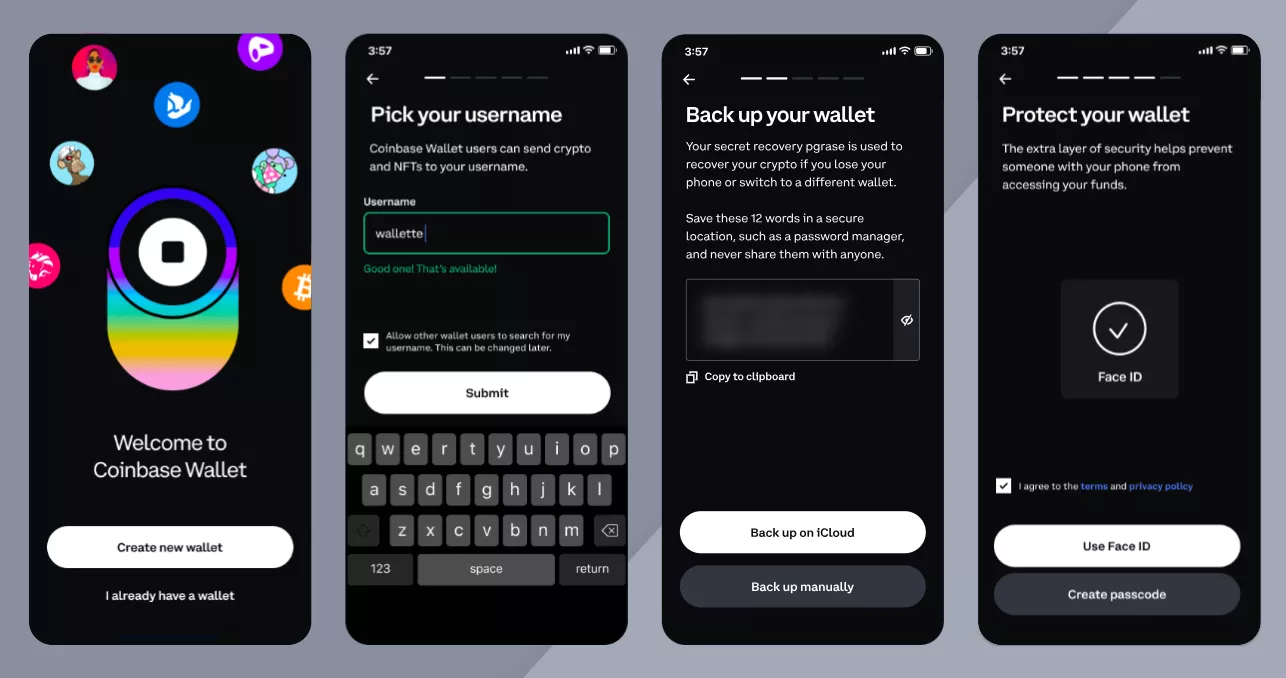
But when it comes to storing your hard-earned crypto, security is everything. So, is Coinbase trustworthy? Let’s take a closer look at the main Coinbase Wallet security measures to find out.
Coinbase Wallet safety features
Coinbase Wallet is considered safe and secure due to its non-custodial nature. Simply put, it means that nobody, including Coinbase itself, can access your wallet, letting you have full control over the security keys you use to access your crypto. You create a master password, which will remain the only way to access your account, minimizing the risk of break-in.
Now, to be more specific, here’s a brief Coinbase Wallet security overview.
- Coinbase Wallet encryption: Coinbase’s cold wallet uses AES-256 — one of the most reliable encryption standards to date. It secures your private keys, as well as wallet addresses and other sensitive data.
- Master security key: Coinbase Wallet ensures that you are the only one who can access your master (private) key. It’s stored on your device, not on the Coinbase servers, making it much more challenging for anyone to compromise your credentials and gain unauthorized access to your funds.
- Protected transactions: Every transaction is password-protected and requires additional approval, so it would be more difficult for a malicious actor to transfer your funds without you knowing.
- Transaction previews: Coinbase Wallet adds an extra confirmation step to conduct a transaction, showing you the upcoming changes in your crypto or NFT balance. This reduces the risk of manual errors, including mistaken transactions.
- Improval alerts: A decentralized application (dApp) can only withdraw your crypto or NFTs with your consent. dApps always request approval for any transaction within your wallet.
- Blocklists: Since not all dApps are legit and secure, Coinbase Wallet comes with a blacklist consisting of suspicious and questionable applications. So, if you happen to deal with a fishy decentralized app, you will get a corresponding warning message from Coinbase.
- Spam token management: Crypto traders may fall victim to spam tokens delivered to their wallets to lure them to potentially dangerous websites. Coinbase Wallet helps avoid this outcome by filtering out malicious addresses and airdropped assets.
- Hardware wallet support: It‘s possible to connect your hardware wallet to Coinbase Wallet for additional security. In particular, Coinbase is compatible with Ledger, Trezor, and KeepKey wallets.
- Open-source code: Coinbase Wallet is based on open-source technologies, so anyone can audit its code and ensure it’s trustworthy.
These features make Coinbase Wallet one of the safest options for storing and managing cryptocurrencies. Currently, over 1 million users use the Coinbase wallet extension, while the application has been downloaded more than 10 million times from the Google Play Store and App Store.
As for independent security audits, Coinbase Wallet has an average rate of 4+ stars on TrustRadius, Forbes Advisor, and Investopedia.
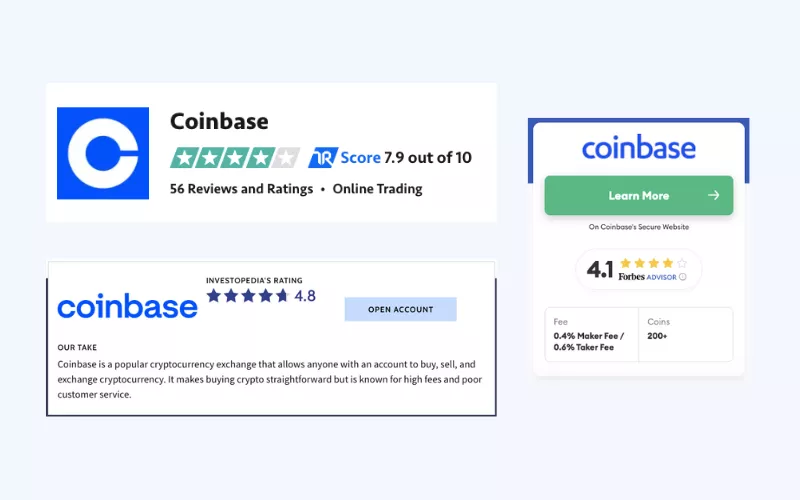
But is Coinbase safe from hacking and other cyber-threats? Sadly, no tech solution (especially as sensitive as a crypto wallet) comes without downsides. Let’s look at the most significant advantages and disadvantages of Coinbase Wallet.
Coinbase pros and cons
Here are the benefits and drawbacks of storing your crypto funds in Coinbase Wallet.
| 👍 PROS | 👎 CONS |
| User-friendly interface Robust security features Integrations with offline (hardware) wallets Availability of decentralized apps (dApps) Support of 5,500+ currencies and assets | The possibility of losing access to your account if the master keys are lost Relatively high transaction fees Prone to some forms of cyberattacks like phishing |
As you can see, there are certain Coinbase Wallet safety concerns to be aware of. Let’s discover what you need to look out for, exactly.
What are the risks of a Coinbase Wallet?
Here are several of the most alarming Coinbase Wallet risks you’d better keep in mind.
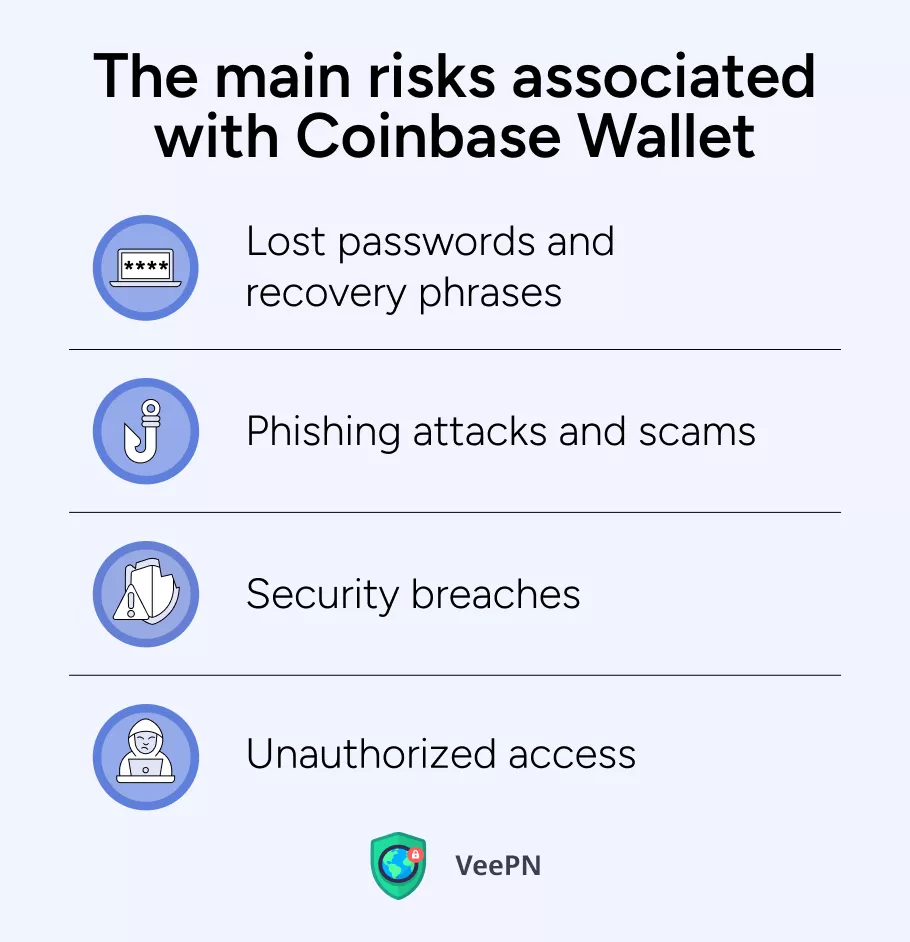
Lost passwords or recovery phrases
Of course, having a master password that no one else can access is a good thing for your security. However, there’s also another side of the coin: if you lose or forget your credentials, you won’t be able to restore access to your wallet. The same applies to your seed (backup) phrase.
Of course, it’s possible to create a digital backup for your Coinbase Wallet password. But that requires extra caution — otherwise, the risk of falling victim to unauthorized access and hacking attempts will increase significantly (more on that in a bit).
Phishing attacks and scams
Phishing attacks usually involve emails that impersonate legitimate services and contain malicious links leading to spoofed websites. Besides, such links can be infected with malware, spyware, and other dangerous software. If you click on such a link or leave your credentials on a phishing website, cyber-criminals can gain access to your Coinbase account and even attempt to break into your Coinbase wallet.
All in all, there are numerous malicious tricks and social engineering techniques scammers can use against you. These include legit-looking security alerts, “too-good-to-be-true” offers, romance scams, fake investment schemes, and many more.
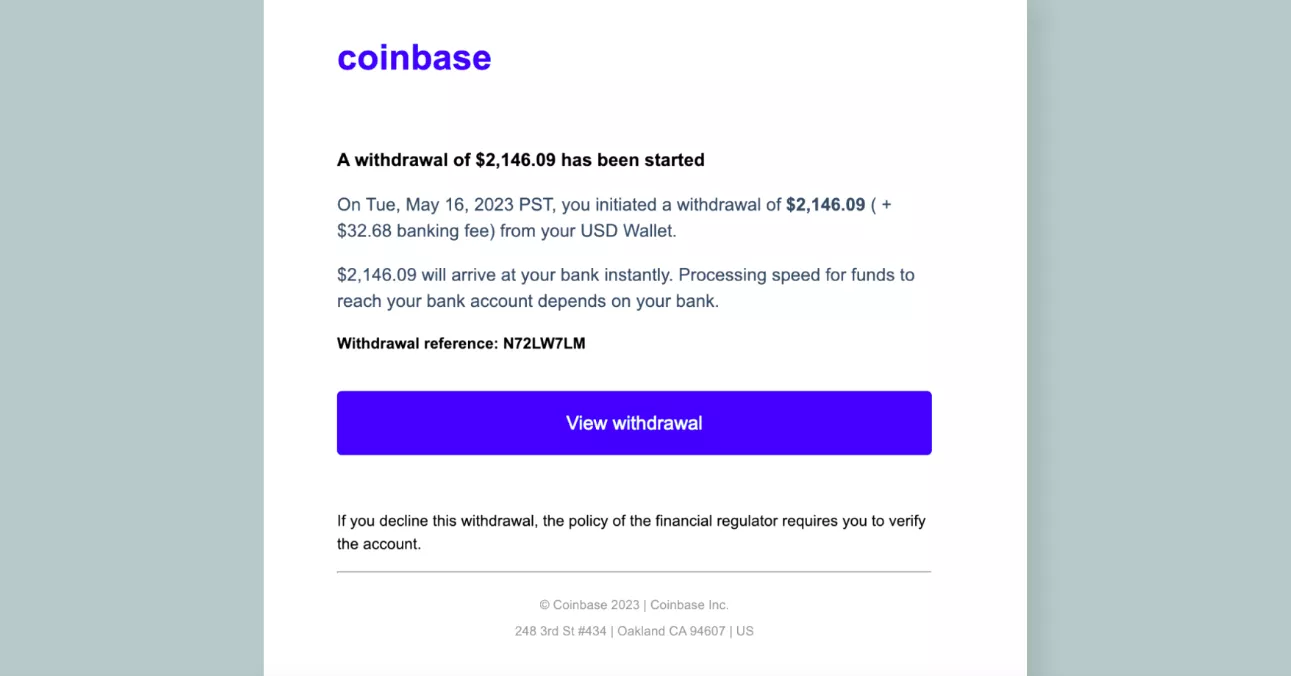
💡 Read also: How to avoid Bitcoin scams
Security breaches
Data breaches are not as common for Coinbace as for many less reliable cryptocurrency exchange platforms. Still, it’s not 100% resistant to such threats. While we will discuss several most significant incidents later on, it’s important to remember that cyber-criminals constantly work on new, more sophisticated tricks and techniques to compromise users’ accounts and credentials.
Unauthorized access
If anyone manages to gain access to your Coinbase Wallet master password or recovery phrase, they can get in and steal your funds directly from your account. The rule of thumb here is to never, under any circumstances, share your private key. But as mentioned, scammers often find ways to deceive users into revealing this confidential information.
Of course, Coinbase does its best to prevent these issues and enhance security measures. Still, you may wonder whether the service has suffered from any real-world incidents or cyber-attacks leading to data or money losses. So, has Coinbase Wallet ever been hacked?
Real-life examples of Coinbase Wallet security issues
There were a couple of security breaches involving Coinbase Wallet hacked or compromised accounts. Let’s look at the most significant ones.
- Compromise email service (2015): Cyber-criminals managed to compromise SendGrid, a popular email service used by over 180,000 companies, targeting specifically Coinbase. Soon afterward, Coinbase confirmed the attack and claimed that no crypto was stolen.
- SMS 2FA vulnerability (2017): Security experts from Positive Technologies warned that Coinbase is prone to a significant SMS-based two-factor authentication vulnerability. They proved that it was possible to intercept the SMS verification code and use it for unauthorized access.
- Zero-day phishing attack (2019): Attackers conducted a highly sophisticated zero-day phishing attack against Coinbase by sending a legitimate-looking email from Cambridge University. Although Coinbase successfully resisted the attack, they shared the details regarding this case to show how tricky malicious attempts can be.
- Massive security breach (2021): One of the most alarming cyberattacks against Coinbase took place in May 2021. Hackers exploited the flaw in the service’s SMS account recovery process. As a result, the accounts of over 6,000 Coinbase users were compromised.
- Another SMS scam (2023): One more SMS-related incident, this time targeted against Coinbase employees, occurred in February 2023. An SMS phishing scheme allowed cyber-criminals to expose names, emails, phone numbers, and other sensitive data.
While even the most secure digital wallets aren’t 100% immune to cyber-threats, it’s worth taking control by implementing some simple yet efficient practices. Find some valuable tips on how to eliminate Coinbase Wallet hacking risk below.
How to secure your Coinbase account and wallet
Here’s what you can do to enhance your Coinbase Wallet security and protect your crypto assets:
- Use strong and unique passwords. Make sure your master key and recovery phrase are strong and unique. Don’t use the same passwords repeatedly since that may lead to a password-stuffing attack.
- Enable Coinbase Wallet two-factor authentication (2FA). Activate 2FA to apply a second verification method, such as a confirmation code or biometrics, to access your crypto wallet. But keep in mind that Coinbase’s SMS-based authentication has suffered from cyberattacks several times.
- Back up your private key and recovery phrases. While cloud backup for Coinbase Wallet private key management is possible, it’s important to use well-protected data storage for this purpose. Consider reliable password manager tools, such as LastPass or Keeper.
- Don’t overshare your data. Keep the information about your secure cryptocurrency wallet to yourself. Sharing any sensitive details with strangers might lead to disastrous outcomes.
❗️Stay alert! Scammers use social media platforms like Instagram or dating apps like Tinder to trick users into exposing sensitive financial info.
- Update your system and software. Timely updates of your operating system and software will save you from unnecessary headaches related to known flaws and vulnerabilities.
- Clean your devices from viruses. Use a premium Antivirus tool, such as VeePN Antivirus, to run scheduled system scans and detect threats before they become critical. Gain 24/7 protection against viruses, malware, adware, and other malicious programs that could target your Coinbase Wallet.
- Track your Coinbase activity like a hawk. Keep tabs on every single transaction and login. If something even remotely sketchy pops up, don’t wait and hit up Coinbase support ASAP before scammers make a move.
- Dodge shady websites and links. One bad click, and boom, your crypto’s gone. NEVER connect your wallet to unverified websites or shady-looking links. Stick to legit exchanges like Coinbase, Binance, Crypto.com, or Kraken, and if a link looks suspicious? Don’t touch it.
- Watch out for Coinbase account scams. Got an email from “Coinbase Support”? Don’t trust it blindly. Scammers are pros at faking emails to steal your login info.
- Use Coinbase vault. Coinbase vault is an additional storage for your crypto with more advanced security measures. Since it comes with multi-step approval of withdrawals and longer delays than Coinbase Wallet, the vault is more suitable for the assets you’re not about to trade anytime soon.
- Use a VPN and stay invisible. A virtual private network (VPN) encrypts your data, hides your location, and makes it nearly impossible for hackers to track you. Especially crucial if you’re checking your wallet on public Wi-Fi (because hackers LOVE using coffee shop Wi-Fi). Want next-level protection? VeePN’s got you covered.
Shield your crypto wallets with VeePN
Looking for a convenient yet effective tool to add an extra layer of security to your Coinbase Wallet? Check out VeePN! Here are the main features and benefits of our premium VPN for crypto trading:
- 💎 AES-256 encryption: Take advantage of robust end-to-end encryption that covers your entire Internet traffic, including crypto exchange accounts, emails, and applications. Make sure no one is snooping around to get their hands on your sensitive data.
- 💎 NetGuard: Protect your online presence from third-party monitoring, malware-infected links, deceptive ads, and malicious websites. VeePN NetGuard will help you avoid phishing attacks, spoofed links, and many other crypto-related risks.
- 💎 Kill Switch: Enable this feature to prevent potential data leaks even if your VPN connection suddenly fails. The moment it happens, VeePN will interrupt your access to the Internet, providing complete peace of mind.
- 💎 Double VPN: Need increased security for particularly sensitive activities, such as transferring crypto or withdrawing funds from your Coinbase Wallet? We got you covered. Use Double VPN to connect to two different VPN servers simultaneously and get twice as powerful defense.
- 💎 VeePN Antivirus: Conduct regular system scans to catch and remove malicious files, viruses, and harmful programs that could secretly spy on you. Get a powerful tool against malware, trojans, warms, injection attacks, and other threats.
- 💎 Breach Alert: Be the first one to know about potential data leaks on Coinbase and any other platforms or websites. VeePN’s Breach Alert continuously monitors the web and informs you once your private data is noticed in a security breach, letting you take control and strengthen your security.
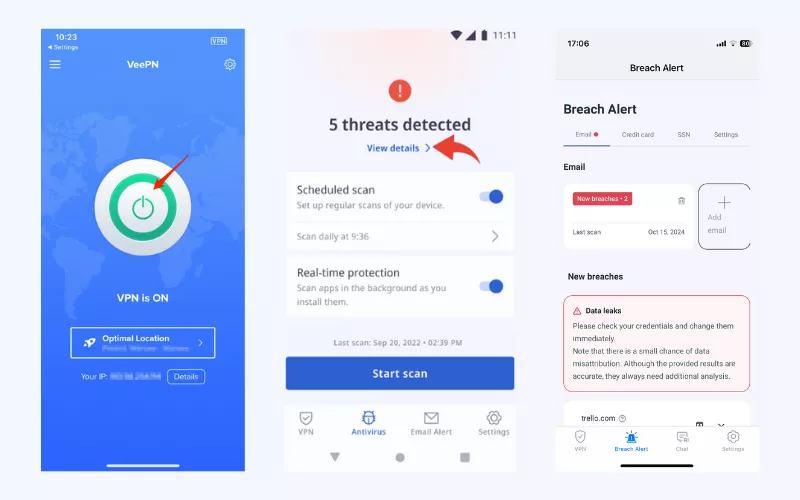
Take your Coinbase Wallet security to the next level — try VeePN today risk-free with a money-back guarantee!
FAQ
Since Coinbase and Coinbase Wallet are two different products provided by the same company, their security measures also vary. Coinbase is a custodial crypto exchange platform, where users’ private keys are held on users’ behalf. Meanwhile, Coinbase Wallet is a non-custodial application, meaning that users have complete control over their private keys. In general, non-custodial solutions are considered more secure than custodial ones.
Trust Wallet is owned by Binance, while Coinbase Wallet is one of the products provided by Coinbase. While both wallets are safe and legitimate, they have somewhat different features.
Here’s a brief summary of Coinbase Wallet specifics:
- More integrated into the Coinbase exchange ecosystem
- Good for browsing various decentralized apps
- Suitable for experienced crypto traders and investors
- Non-custodial
In turn, here are the key specifics of Trust Wallet:
- Independent from crypto exchange platforms
- Easy to use and navigate
- Suitable for both beginners and professionals
- Non-custodial
Yes, Coinbase Wallet is a self-custody crypto wallet that allows you to store and manage your cryptocurrencies and NFTs. On top of that, it’s possible to connect to various decentralized apps and interact with them using your wallet.
All in all, when comparing Coinbase Wallet vs. other wallets, it’s considered one of the best-protected solutions out there. It’s non-custodial, meaning that Coinbase and other third parties can’t access your data and assets. Also, Coinbase Wallet user protection consists of some decent measures, including AES-256 encryption, transaction protection, improval alerts, and spam token management. Check out this blog for more info.
VeePN is freedom
Download VeePN Client for All Platforms
Enjoy a smooth VPN experience anywhere, anytime. No matter the device you have — phone or laptop, tablet or router — VeePN’s next-gen data protection and ultra-fast speeds will cover all of them.
Download for PC Download for Mac IOS and Android App
IOS and Android App
Want secure browsing while reading this?
See the difference for yourself - Try VeePN PRO for 3-days for $1, no risk, no pressure.
Start My $1 TrialThen VeePN PRO 1-year plan







